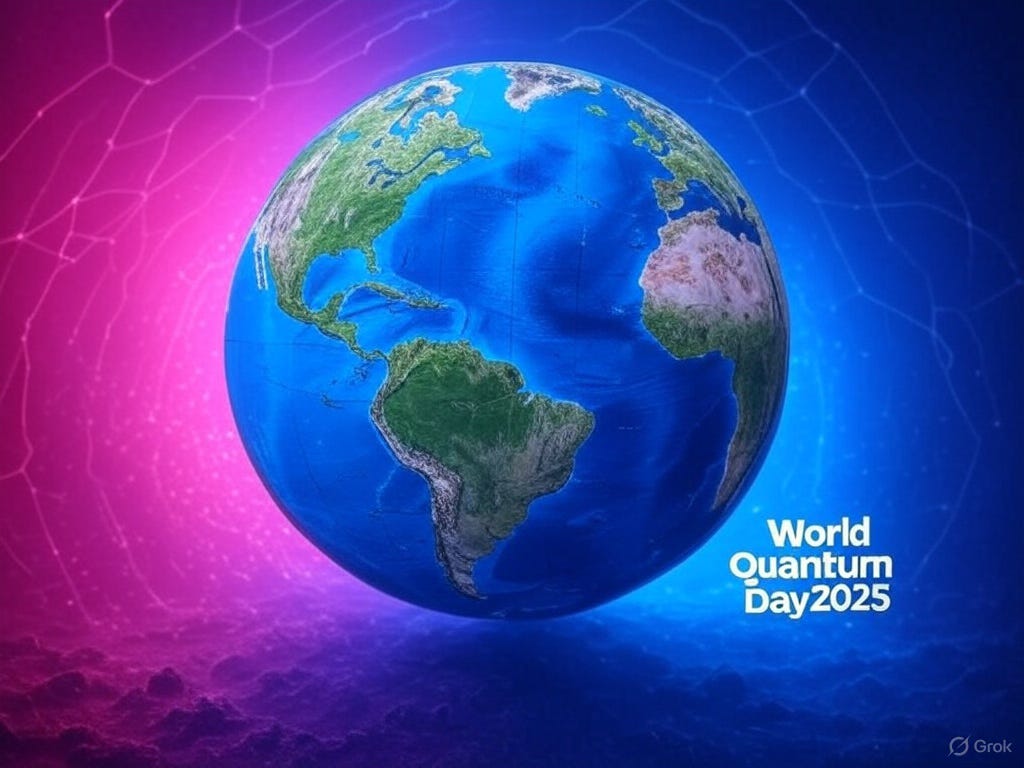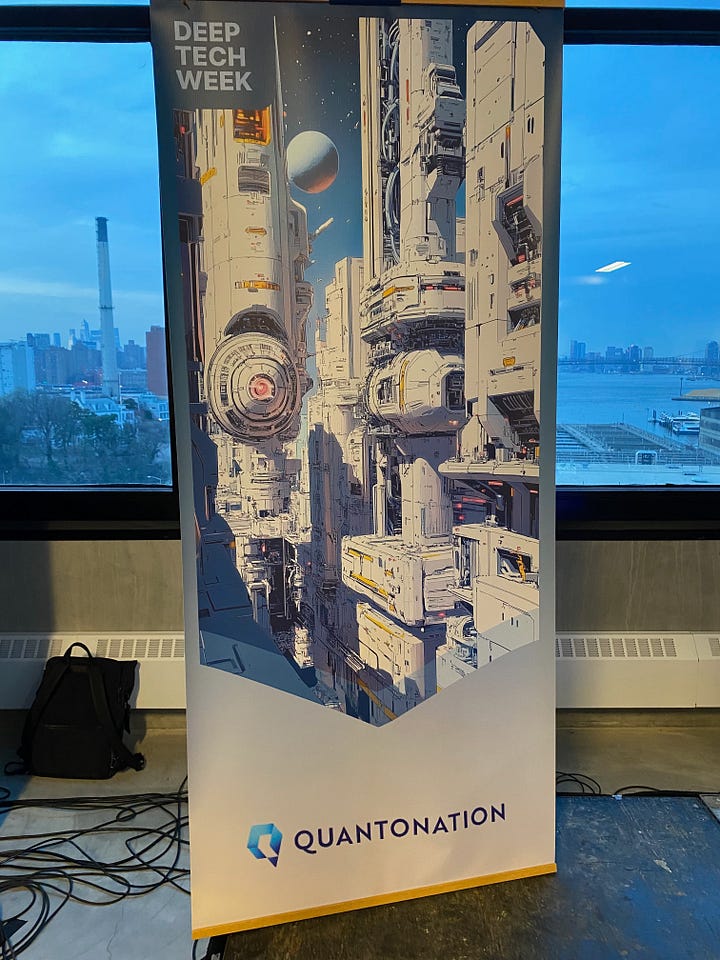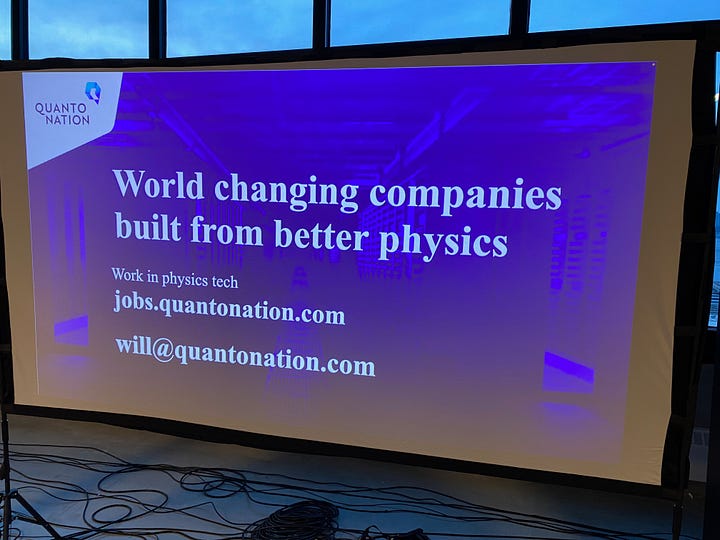
Welcome! This is The Quantum Stack. Created by a Travis L. Scholten, it brings clarity to the topic of quantum computing, with an aim to separate hype from reality, and help readers stay on top of trends and opportunities. To subscribe, click the button below.
How has your International Year of Quantum Science and Technology been going thus far? Mine has been…busy. I’m excited to share that my work at IBM Quantum is taking me more and more into the orbit of Washington, DC. Ever since my Policy Hacker fellowship with the Foundation for American Innovation, I’ve been increasingly interested in questions related to the intersection of technology and policy. So being able to explore that (in some quantum-focused fashion) as part of my day job is great.
Today is a particularly special day during the International Year: World Quantum Day:
The World Quantum Day is celebrated on April 14, a reference to 4.14, the rounded first digits of Planck’s constant: 4.1356677×10−15 eV⋅s .
(Note that the creation of World Quantum Day preceded that of the International Year – so mark your calendars for April 14, 2026!)
In honor of World Quantum Day, I'm sharing 5 things on my mind about happenings around this technology:
Marking 1 year since my paper “Assessing the Benefits and Risks of Quantum Computers” was published
Michael Kratsios becoming Director of the White House Office of Science and Technology Policy
New York State as a “dark horse” in the national quantum race
DARPA’s Quantum Benchmarking Initiative (QBI) builds momentum
Learning more about “Physics Tech” in NYC
1. The Benefits and Risks of Quantum Computers: One Year Later
In January of last year, my paper “Assessing the Benefits and Risks of Quantum Computers” was put on the arXiv. You can learn more about the paper here:
The core point of the paper was to examine the currently-available literature to understand whether quantum computers could provide economic benefits before they are capable of performing the kinds of “encryption-killing” computations which are commonly used to motivate why quantum computing is so important. Based on what we saw at the time, my co-authors and I concluded
There is a credible expectation that quantum computers will be capable of performing computations which are economically-impactful before they will be capable of performing ones which are cryptographically-relevant.
How has that conclusion stood up?
Pretty well, I’d say — though of course I have a keen interest in this being the case!
Why do I think so? Two things.
First, advances in quantum algorithms and algorithms have continued apace. Especially in the past year, the combination of quantum + HPC has risen to the forefront of people’s minds on how to accelerate near-term usefulness of quantum computers.
IBM in particular has developed a growing body of literature on how quantum + HPC can be combined to address interesting problems in chemistry and materials science:
Chemistry Beyond Exact Solutions on a Quantum-Centric Supercomputer
Quantum-Centric Algorithm for Sample-Based Krylov Diagonalization
Computing band gaps of periodic materials via sample-based quantum diagonalization
Second, while there has been a continued push to advance using quantum computers for cryptographic purposes, in my mind the major gap continues to be a solid resource estimate of Regev’s 2023 factoring algorithm, which does offer – in theory – an advantage over Shor’s algorithm. (Regev’s algorithm is noted in the paper; Quanta Magazine has a nice article on this algorithm here.) To date though, I haven’t seen concrete numbers on the requisite circuit complexities (width, depth, and number of circuits) for specific cryptographic key sizes. This is definitely one of the “known unknowns” about Regev’s algorithm and whether it really could accelerate the timeline to cryptographically-relevant quantum computation.
So for now, I’d say the conclusion of the paper still remains valid. Let’s see what this year brings!
2. The Confirmation of Michael Kratsios as Director of the White House Office of Science and Technology Policy, and Science Adviser to the President
Mindful that the drama in DC is the subject of much frustration and bewilderment these days – and in no way trying to trivialize what is certainly a trying time for many – noting one potential ray of hope: that the man in charge of the Office of Science and Technology Policy not only advocated for quantum computing while serving as Chief Technology Officer of the United States during President Trump’s first administration, his testimony at his confirmation hearing explicitly included quantum as one of the key technologies to prioritize for US leadership, and noted the importance of technical expertise in setting sound policy:
The shape of future global order will be defined by whomever leads across AI, quantum, nuclear, and other critical and emerging technologies.
&
As Director, I will build a deep bench of policy experts to ensure that the President and the White House have the necessary technical advice to meet the challenges of our moment.
~ From Michael Kratsios’ testimony before the US Senate Committee on Commerce, Science, and Education, 2025 February 25
3. New York State’s Strong Quantum Ecosystem
During the past year, my work put me in contact with New York State’s quantum consortium. Being a transplant to NYS, I wasn’t fully aware of what the state has to offer in quantum. Having engaged with this consortium over the past year, what’s become clear is that in terms of a continuum of commercialization – from lab to fab, from fab to vendors & system integrators, and from system integrators to end-users and the broader market – NYS has quite a breadth of research groups, startups, companies, and commercial entities engaged in quantum technologies.
One might even say “NYS ♥️QIS”, to riff on the iconic “I ♥️NY” logo…
While the ecosystems in Illinois and Colorado – and, recently, Maryland – have gained mindshare and attention around quantum technologies and place-based development, I wouldn’t count NYS out!
For a detailed map showing all the organizations working to grow quantum across NYS, check this out.
4. DARPA’s Quantum Benchmarking Initiative (QBI) gains steam
The QBI is an extension in scope and ambition of a recent DARPA program called Underexplored Quantum Systems for Utility-Scale Quantum Computing (US2QC). The purpose of the QBI, according to DARPA, is
To determine if it’s possible to build an industrially useful quantum computer much faster than conventional predictions. Specifically, QBI is designed to rigorously verify and validate if any quantum computing approach can achieve utility-scale operation — meaning its computational value exceeds its cost — by the year 2033.
The QBI is proceeding in 3 stages:
Stage A: performers describe a concept of what a utility-scale quantum computer could look like & argue a plausible path to realizing it.
Stage B: performers describe a plan by which such a computer can be built & identifying the obstacles and mitigation measures required
Stage C: performers leverage USG expertise to verify and validate that their concept can be constructed.
You can learn more about DARPA’s QBI here.
Recently, DARPA has announced nearly 20 companies which have been chosen to start Stage A.

The list of companies contains several of the “usual cast of characters”; interestingly, the QBI seems to be intended to foster a rich ecosystem of different quantum computers across many modalities.
For a refresher on different qubit modalities, see:
5. A “Physics Tech” event in NYC
A few weeks ago, I attended a “Physics Tech” event in Brooklyn organized by Quantonation, an early-stage VC fund investing in deep tech companies in physics and computing. This event was part of a broader “NYC Deep Tech Week” event, and was a really interesting opportunity to hear more about – as the organizers put it – “World-changing companies built from better physics”. The event was hosted just above the offices of Qunnect, an NYC-based quantum networking startup, and as part of the programming, I was able to take a tour of their office from the CEO herself.
Thanks very much to Will Zeng and Christophe Jurczak of Quantonation for organizing!


Wrap Up
World Quantum Day serves as a fantastic reminder of the incredible potential of quantum technologies. The field is clearly buzzing with progress, from tangible technological advancements to crucial policy discussions and the growth of vibrant innovation ecosystems. As the International Year of Quantum Science and Technology continues to roll on, here’s to future advances and announcements!
What are your thoughts on the developments discussed? Share your perspectives in the comments below!
P.S. In addition to The Quantum Stack, you can find me online here.
Was this article useful? Please share it.
Note: All opinions expressed in this post are my own, are not representative or indicative of those of my employer, and in no way are intended to indicate prospective business approaches, strategies, and/or opportunities.
Copyright 2025 Travis L. Scholten. All rights reserved.








Related to the topic of quantum + HPC: as yet another indication of how this area is gaining steam in the industry, sharing something which came across my inbox today -- a call for papers from the ACM Transactions on Quantum Computing for a special issue dedicated to quantum, HPC, and AI
https://dl.acm.org/pb-assets/static_journal_pages/tqc/pdf/TQC-SI-CfP_HPC-AI-Technologies-Integrations-Quantum-Computing.pdf